A few weeks ago we took a look at the Intel Atom S1260 from a few different angles. First, we showed the Supermicro SYS-5017A-EF which has great power consumption characteristics. When we tested the Intel Atom S1260 performance using our Windows benchmarks. One thing we noticed was that Windows was that background processes took a toll on the low power CPU. We were also switching to our Linux test suite so we held off on publishing numbers until now. In today’s results, we are going to also use the results from our Amazon AWS EC2 v. Rackspace at under $0.25/ hour results. In the coming days, the benchmark set will become much larger. Let’s see how the Intel Atom S1260 fares.
Test Configuration
Supermicro originally sent this test unit with a 1TB Western Digital RE4 drive and 2GB of memory. To make a generation-on-generation comparison, we outfit the test system with 8GB of RAM and a SSD. We did grab a few numbers with the 1TB WD RE4 also as this is a typical configuration.
- 1U Barebones: Supermicro SYS-5017A-EF
- Included motherboard: Supermicro X9SBAA-F
- Included CPU: Intel Atom S1260 “Centerton” SoC
- Memory: 8GB Kingston Low-Power ECC 1333MHz DDR3L SODIMM
- Hard Drive/ SSD: WD RE4 1TB or Samsung 840 Pro 256GB
- OS: Ubuntu 12.04 LTS
Hopefully this will represent a typical configuration as deployed.
Intel Atom S1260 Performance
More dedicated server hardware will be compared shortly. For now, the following results will compare the Intel Atom S1260 to low end cloud instances. This is a fairly good comparison because it shows two sets of systems that are more or less comparable to many server buyers. One major note here is that the Atom machine does have 8GB of RAM and a SSD. For tasks that are heavily I/O dependent or those that involve simple caching, the Intel Atom S1260 will end up being faster in real world performance. These are the applications Intel is targeting with the Centerton Atom lineup. With that being said, let’s check out performance.
Hardinfo Performance
hardinfo is a well known Linux benchmark that has been around for years. It tests a number of different aspects of CPU performance.
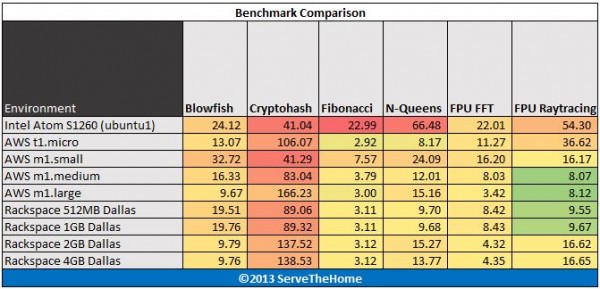
Here we see the in-order architecture of the Intel Atom S1260 really suffer compared to the cloud instances. The Amazon AWS EC2 t1.micro is benefiting from its “burst” performance.
UnixBench 5.1.3 Performance
UnixBench may be a defacto standard for Linux benchmarking these days. There are two main versions, one that tests single CPU performance on that tests multiple CPU performance. UnixBench segments these results. We run both sets of CPU tests. Here are the single threaded results:

Cloud instances today generally utilize heavy out-of-order execution units and thus in UnixBench we see them do well. UnixBench is a much longer test than hardinfo so the Amazon AWS EC2 t1.micro instance does not have burst performance throughout the test. Also, the Amazon AWS EC2 t1.micro and m1.small instances, along with the Rackspace 512MB and 1GB instances do not have multiple cores. We need to look at the multiple core performance of the Intel Atom S1260 to get a complete picture.

Here we see the UnixBench numbers end up being fairly decent handily beating the Amazon AWS EC2 t1.micro and m1.small results in uniprocessor mode.
c-ray 1.1 Performance
c-ray is a very interesting ray tracing benchmark and provides both consistent results and some clear separation. Originally we were using a large 7500×3500 simple scene. that worked well for the low end machines but the dual Intel Xeon E5-2690 systems were running it in about a second. We then built a benchmark around a 1920×1200 but more complex scene. Here are the cloud instances running the benchmark:
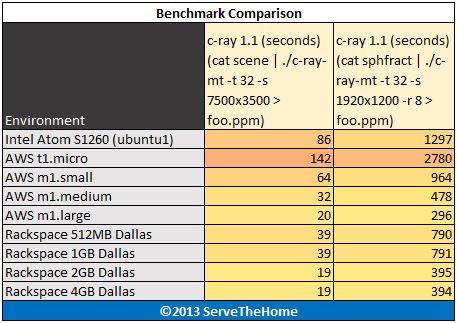
Here we see some significantly variable numbers. We can clearly see that the t1.micro instance is no match for the Intel Atom S1260.
Crafty Chess Performance
Crafty is a well known chess benchmark. It is also one where we saw issues last time with the Phoronix Test Suite and running on ARM CPUs. Another key consideration is that running on the default Amazon AWS AMI for Ubuntu 12.04 LTS will not install crafty from default Amazon repos. This one may end up getting removed from the final suite. We are running crafty in single threaded mode for the time being while we sort out how to build a standard for number of threads to run.
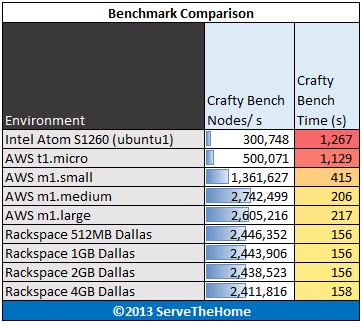
In terms of the Crafty chess engine, this is another workload where the Intel Atom S1260 architecture struggles.
Phoronix Test Suite Performance
We are using four tests from the Phoronix Test Suite: pts/stream, pts/compress-7zip, pts/openssl and pts/pybench. STREAM by John D. McCalpin, Ph.D. is a very well known benchmark. So much so that the benchmark is highly optimized when results are presented. Vendors use the STREAM benchmark to show architectural advantages. Needless to say, oftentimes these results are hard to reproduce unless one is trying to squeeze every ounce of performance from a machine they are optimizing for. Since the rest of the industry does that, we are taking a different approach. One installation run across all systems. For this we are using the Phoronix Test Suite version pts/stream. Specifically we are using the lowest bandwidth figure Triad test to compare memory throughput. 7-zip compression benchmarks were a mainstay in our Windows suite so we are including it again on the Linux side as a compression benchmark. The pts/openssl benchmark is one we found a small issue on with the Amazon AWS EC2 t1.micro instance earlier. The micro instance had nice burst speed but fell off dramatically after that. Looping the test gave consistent results. Python is a widely used scripting language. In fact, it is arguably becoming even more popular these days so we decided to include a pyBench benchmark in the results.
Here are the results of the Phoronix Test Suite benchmarks:
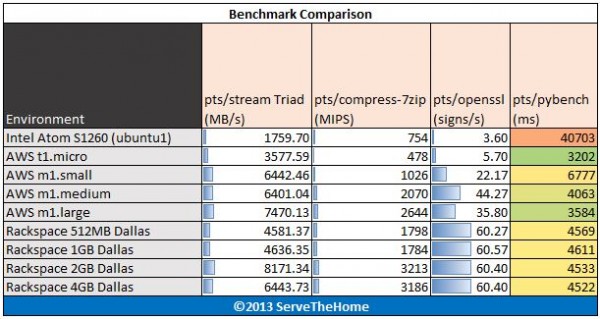
The PTS results validate the trend that we have seen. Just to validate some of the numbers we ran numbers on Windows. Here are the stream benchmark results:
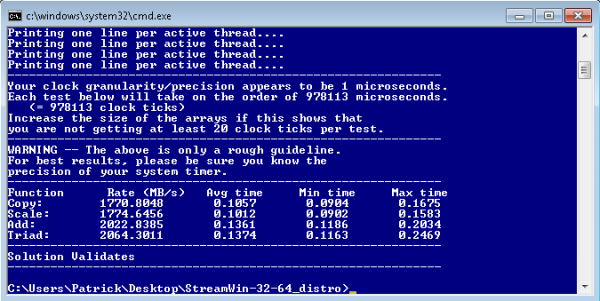
The average of results was very similar to the pts/stream results we had in Linux. The screenshot above shows stream benchmark numbers in the same ballpark as what we saw under Linux with the Intel Atom S1260.
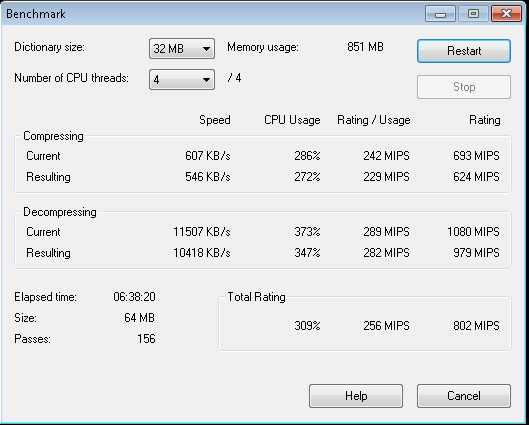
Again, we ran the 7-Zip benchmark in Windows and saw similar results again. The important thing with a new CPU is ensuring that a single operating system does not have an issue with the architecture/ processor model.
Conclusion
So this is a very interesting test. There is a clear reason why Intel has a major overhaul on the roadmap. ARM competition has a long way to go against an Intel Xeon E3 series CPU, but the Intel Atom S1260 is clearly in danger. With that being said, we must remember that the ability to have 8GB of RAM in the system that will cost < $500 is great. Power consumption is very low with the Intel Atom S1260 so those users looking for simple dedicated servers will find the Intel Atom S1260 to be a very solid choice. A vast portion of websites on the Internet could run without issue on one of these servers, and many sites per Intel Atom S1260. Applications such as pfsense also are fine in most situations with this level of compute. Over the next few weeks we will be adding many new CPUs to the comparison. Hopefully that will show how the Intel Atom S1260 compares to some of the higher-end server options. Remember that the Amazon AWS EC2 t1.micro instance is around $43/ month, so for a quiet server sitting in a lab, this 1U Supermicro would have a sub-10 month payback period even when including electricity.

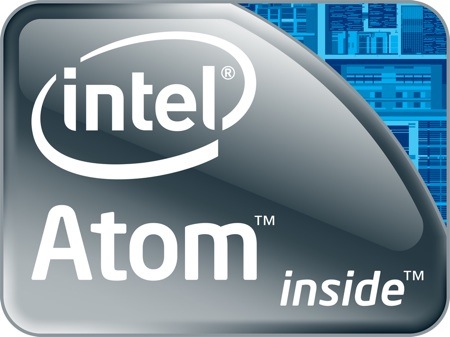
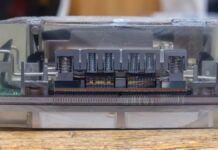
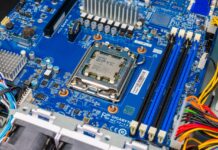
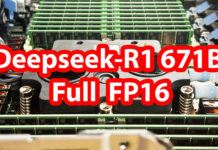
Was hoping the Atom would be faster. Seems about right though